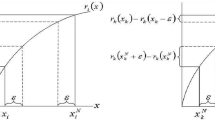Abstract
This paper presents a model of non-linear common-pool resource experiments with boundedly rational agents. The model is based on data of experiments with and without communication and reproduces individual and not only aggregated data. It is part of a framework for modeling economic experiments. The agents exhibit bounded rationality in the sense that they use simple heuristics and simple learning processes in an aspiration adaptation process, and base their decisions on norms and “’emotions”. A major objective of this kind of modeling is to implement agents in a way that makes it possible for humans to identify with agent behaviour.
Preview
Unable to display preview. Download preview PDF.
Similar content being viewed by others
References
Demsetz, H.: Toward a theory of property rights. American Economic Review 57, 347 (1967)
Hardin, G.: The tragedy of the commons. Science 162, 1243–1248 (1968)
Ostrom, E. (ed.): Governing the commons: the evolution of institutions for collective action. Cambridge, New York (1990)
Ostrom, E., Gardner, R., Walker, J. (eds.): Rules, games, and common-pool resources. The University of Michigan Press, Ann Arbor (1994)
Deadman, P.J., Schlager, E., Gimblett, R.: Simulating Common Pool Resource Management Experiments with Adaptive Agents Employing Alternate Communication Routines. Journal of Artificial Societies and Social Simulation 3 (2000), http://jasss.soc.surrey.ac.uk/JASSS/3/2/2.htm
Duffy, J.: Learning to speculate: Experiments with artificial and real agents. Journal of Economic Dynamics and Control 25 (2001)
Forno, A.D., Merlone, U.: From classroom experiments to computer code. Journal of Artificial Societies and Social Simulation 7 (2004), http://jasss.soc.surrey.ac.uk/7/3/2.html
Gigerenzer, G., Selten, R. (eds.): Bounded Rationality. The Adaptive Toolbox. The MIT Press, Cambridge (2001)
Selten, R.: What is bounded rationality? In: Gigerenzer, G., Selten, R. (eds.) [8], ch. 2, pp. 13–36. MIT Press, Cambridge (2001)
Ostrom, E.: Toward a behavioral theory linking trust, reciprocity, and reputation. In: [23], ch. 2, pp. 19–79 (2004)
Ebenhöh, E., Pahl-Wostl, C.: Agent-based modelling with boundedly rational agents. In: Rennard, J.P. (ed.) Handbook of Research on Nature Inspired Computing for Economy and Management, Idea Group (in press)
McClintock, C.G.: Social motivation - a set of propositions. Behavioral Science 17, 438–454 (1972)
Andreoni, J.: Giving with impure altruism: Applications to charity and ricardian equivalence. Journal of Political Economy 97, 1447–1458 (1989)
Gerard, H.B., Conolley, E.S.: Conformity. In: McClintock, C.G. (ed.) Experimental Social Psychology. Holt, Rinehart and Winston, New York, pp. 237–263 (1972)
Simon, H.A.: Models of Bounded Rationality. 3. The MIT Press, Cambridge (1997)
Fehr, E., Schmidt, K.M.: A theory of fairness, competition, and cooperation. The Quarterly Journal of Economics, 817–868 (1999)
Cox, J.C.: How to identify trust and reciprocity. Games and Economic Behavior 46, 260–281 (2004)
McCabe, K.A., Smith, V.L.: Goodwill accounting and the process of exchange. In: [8], ch. 18, pp. 319–340.
Nooteboom, B., Six, F. (eds.): The Trust Process in Organizations, Edward Elgar, Cheltenham UK, Northampton MA USA (2003)
Cook, K.S., Cooper, R.M.: Experimental studies of cooperation, trust, and social exchange. In: [23], ch. 8, pp. 209–244.
Albers, W.: Prominence Theory as a Tool to Model Boundedly Rational Decisions. In: [8], ch. 17, pp. 297–317.
Moss, S., Edmonds, B.: Sociology and simulation: Statistical and qualitative cross-validation. American Journal of Sociology 110, 1095–1131 (2005)
Ostrom, E., Walker, J. (eds.): Trust and Reciprocity. Russel Sage Foundation Series on Trust, vol. VI. Russel Sage Foundation, New York (2004)
Author information
Authors and Affiliations
Editor information
Editors and Affiliations
Rights and permissions
Copyright information
© 2006 Springer-Verlag Berlin Heidelberg
About this paper
Cite this paper
Ebenhöh, E. (2006). Modeling Non-linear Common-Pool Resource Experiments with Boundedly Rational Agents. In: Sichman, J.S., Antunes, L. (eds) Multi-Agent-Based Simulation VI. MABS 2005. Lecture Notes in Computer Science(), vol 3891. Springer, Berlin, Heidelberg. https://doi.org/10.1007/11734680_10
Download citation
DOI: https://doi.org/10.1007/11734680_10
Publisher Name: Springer, Berlin, Heidelberg
Print ISBN: 978-3-540-33380-7
Online ISBN: 978-3-540-33381-4
eBook Packages: Computer ScienceComputer Science (R0)




